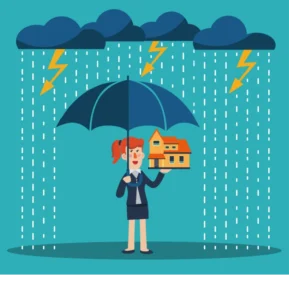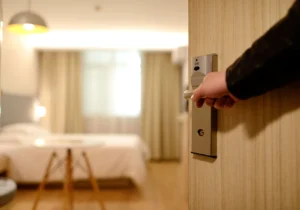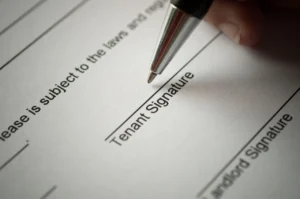Got a Tenant Who Can’t Pay Rent? A COVID-19 Guide for Landlords
 The COVID-19 pandemic has caused layoffs, furloughs, and financial uncertainty for millions of Americans. The result: Many tenants are struggling to pay their rent, and landlords are unsure how to cover their own expenses while helping tenants.
The COVID-19 pandemic has caused layoffs, furloughs, and financial uncertainty for millions of Americans. The result: Many tenants are struggling to pay their rent, and landlords are unsure how to cover their own expenses while helping tenants.
Nearly 60% of landlords said their tenants are unable to pay rent because of the coronavirus, and 80% said they’re willing to work with these renters, according to an American Apartment Owners Association (AAOA) survey of more than 1,100 landlords in May.
“Some tenants are really having a difficult time,” says Alexandra Alvarado, director of marketing and education at AAOA.
Several states have implemented emergency policies to help renters, including eviction freezes, late-fee waivers, and payment grace periods. But, often, landlords are still required to make their mortgage payments and cover other expenses, like taxes and insurance.
Start a dialogue with the renter
Your tenants will probably let you know if they can’t make their rent payments. With the uncertainty surrounding the pandemic, landlords should check in with their tenants as soon as possible, before an issue arises.
“Even starting back in mid-March, as people were getting laid off and businesses were closing down, we encouraged landlords to just reach out, communicate, open up a dialogue, and figure out who may have trouble,” says Charles Tassell, chief operating officer at the National Real Estate Investors Association and owner of 118 rental units in Cincinnati.
Nonpaying tenants are a problem landlords deal with from time to time. With the pandemic, though, Tassell urges them to be especially understanding when renters are in a tough spot financially. He suggests that both parties come up with a payment solution that will work for everyone.
Work out a rent payment plan
Renters have different financial situations, so any arrangement that you make for paying rent can’t be one size fits all.
“Somebody may have reduced hours, somebody else may have been laid off entirely, and we’ve had [landlords] who said they’ve got nurses who just drop a check when they get a chance, because they’re working 80 hours a week,” Tassell says.
Tassell urges landlords to come up with a plan that’s realistic.
“It has to be something that’s workable and manageable,” he says, otherwise the terms might not be met.
For example, perhaps the renters could pay half of their $1,000-per-month rent for three months (or $500), then attempt to pay back what they owe by the end of that period.
Whatever the payment plan, put it in writing, with clear details of the amounts and time frames, Alvarado urges. This creates a paper trail, in case you or your tenant tail to follow through on any of the terms you have agreed upon.
Reach out to mortgage lenders about your options
If you’re a landlord with a mortgage, having tenants who don’t pay rent could mean that you can’t make your mortgage payments.
If this is your situation, the CARES Act (Coronavirus Aid, Relief, and Economic Security Act) helps borrowers (landlords and homeowners alike) by waiving late fees on mortgage payments and suspending foreclosures.
If you’re worried you might come up short on your mortgage payment, contact your lender to see what relief it can offer. This will vary by location, lender, and type of mortgage. For example, Rocket Mortgage by Quicken Loans is offering mortgage forbearance, or a temporary pause in payments.
“Mortgage companies will generally create new payment plans with landlords,” Alvarado says.
But keep in mind they’ll want proof that your tenants aren’t paying, in the form of documentation showing rental income losses.
Tax bills are likely still due
Beyond making mortgage payments, landlords may have other expenses to cover, too. For instance: Property taxes, which cost a national average of $3,500 a year, according to ATTOM Data Solutions.
Because of the pandemic, a few municipalities are letting homeowners and landlords defer tax payments or set up payment plans, according to the Tax Foundation.
For example, Wisconsin is allowing municipalities to waive interest and penalties on late property taxes that are paid by Oct. 1.
Revisit your insurance policy
Home insurance is another expense that landlords need to keep paying, without falling behind. The cost could be sizable: According to the Insurance Information Institute, landlord insurance policies typically cost about 25% more than standard homeowner policies.
Luckily, some states have directed insurers to work with homeowners by creating payment plans, waiving late fees, and not canceling policies for nonpayment.
Some insurers, including Farmers and Liberty Mutual, are extending grace periods and not charging late fees.
Revising your policy now could also help you save money.
“It’s really important that landlords re-look at their insurance policy to find out exactly what’s in it, exactly what’s covered, and then also maybe shop around and get a better quote.” Alvarado says. “They may be paying more on their insurance rates than they need to, and they could save some money there.”
Just don’t cut your liability coverage, since Alvarado expects that the coronavirus could add some extra risks for landlords.
For instance, tenants might sue because they caught coronavirus within the building, arguing that their landlord did not implement sufficient safety precautions for cleaning and maintenance.
Such lawsuits probably won’t get far in court, but they could still be costly if filed, so having good liability insurance will help you sleep better at night.
Check out new small business resources
The CARES Act also includes programs through the Small Business Administration (SBA) for helping small businesses—and yes, landlords do qualify!
You must own your rental properties under an LLC, and should apply for relief as a “business with not more than 500 employees.”
If you do have one or a few employees, the Paycheck Protection Program (PPP) is a potentially forgivable loan for employers who maintain their payroll during the COVID-19 crisis.
The Economic Injury Disaster Loan (EIDL) offers emergency grants up to $10,000 to small businesses harmed because of the coronavirus.
“One of the benefits of SBA funds and the additional funds being pushed out through the federal government is that these banks have capital to loan,” Tassell says.
“It’s not like we’re in the capital crunch that we were in the previous recession. So that is a real benefit to property owners if they have an asset with equity available.”
Avoid evicting renters now, if you can
Across the country, cities and states, including New York and Washington, have issued emergency bans on evictions because of COVID-19, and many courts have been closed.
As courts reopen and bans expire, landlords should still try to hold off on evictions, Alvarado says. However, situations where tenants are damaging the property, involved in criminal activity, or not following social distancing rules may be cause for eviction.
“A lot of tenants are being affected by things outside of their control, and I think landlords should realize that even where it is possible to have an eviction hearing and trial, that process is pretty costly, and it’s time-consuming,” she says.
Even if you get a judgment against a tenant for the rent owed, there’s no guarantee it will be paid. Quite apart from that, it’s simply not an ethical thing to do at a time when people are struggling.
“Working with the tenant may be better for both parties,” Alvarado says. “It’s a situation-by-situation thing, where landlords will have to look at their financials and what they can afford, see if they’ve worked out anything with their mortgage provider, and see if it makes sense to work with the tenant in that way.”
Source: realtor.com













 Accessibility
Accessibility